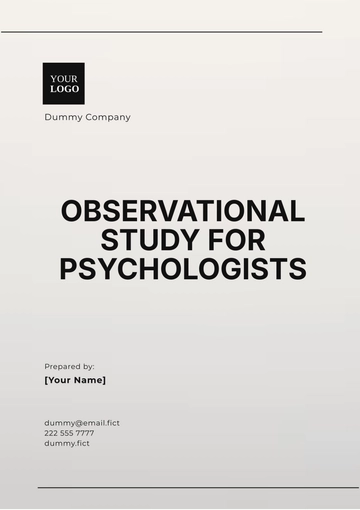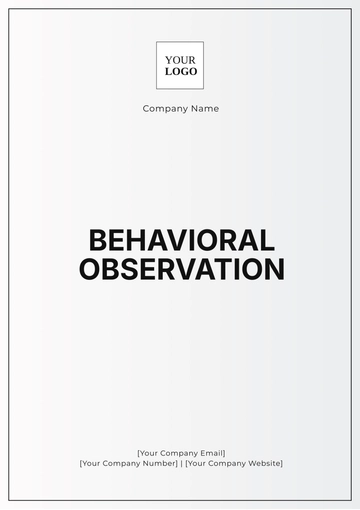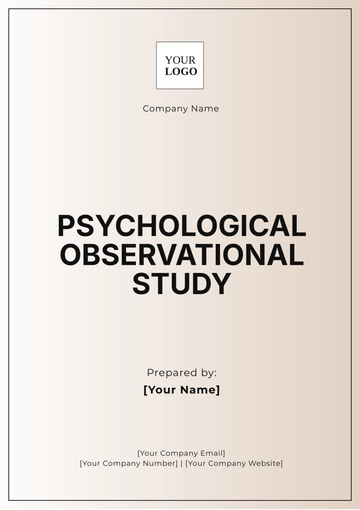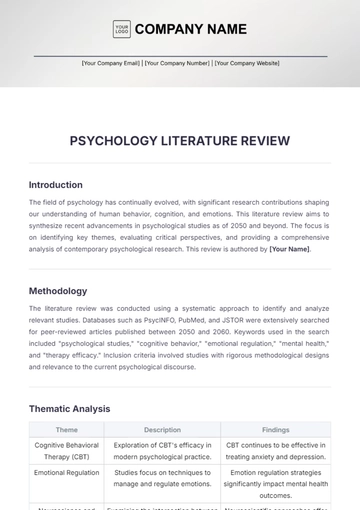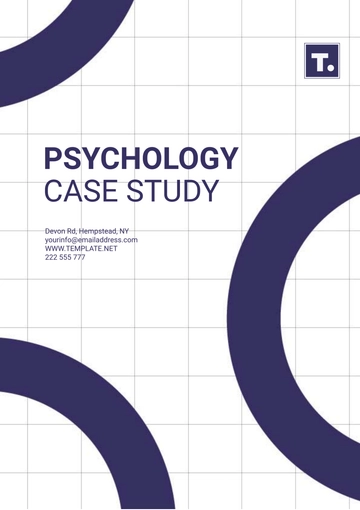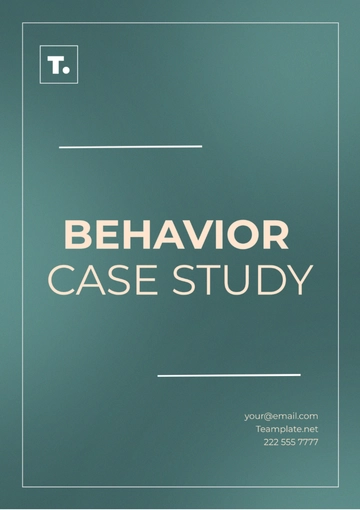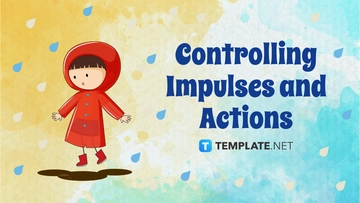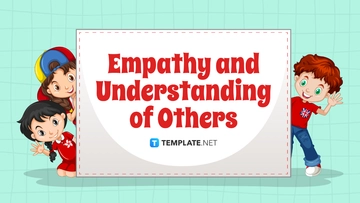Free Psychological Observational Study
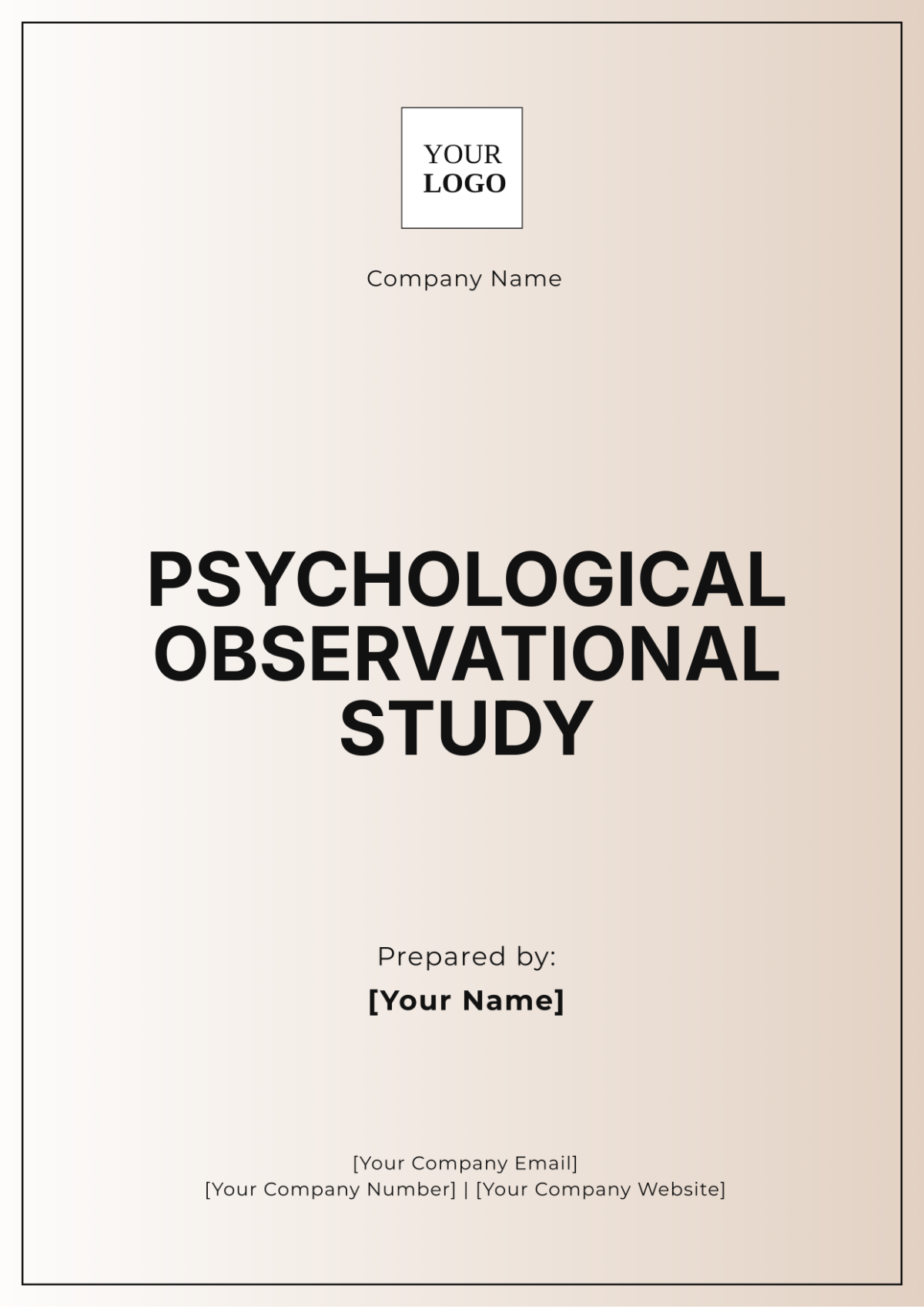
Prepared By: [Your Name]
The Impact of Social Media Usage on Adolescent Mental Health
I. Introduction
Background
The prevalence of social media has transformed how adolescents interact, share information, and perceive themselves. Platforms such as Instagram, TikTok, and Snapchat are central to daily life, providing new forms of communication and self-expression. However, this increased connectivity raises concerns about its potential impact on mental health. This observational study investigates how social media usage correlates with self-esteem, anxiety, and overall psychological well-being among adolescents.
II. Objectives
Assess the correlation between social media usage and adolescent self-esteem.
To evaluate the relationship between social media usage and symptoms of anxiety.
To understand the overall impact of social media on adolescent mental health.
III. Methodology
Study Design
This cross-sectional observational study was conducted over six months. Participants were observed in their natural environments without any manipulation of the variables, allowing for a naturalistic assessment of social media's impacts on mental health.
Participants
The study sample comprised 200 adolescents, aged 13 to 18 years, selected from local high schools through stratified random sampling. This approach ensured a diverse representation in terms of gender, socioeconomic status, and ethnicity.
Data Collection
Instruments
Self-Esteem Scale (SES): A validated instrument designed to measure self-esteem levels, with higher scores indicating greater self-esteem.
Generalized Anxiety Disorder 7-item (GAD-7) Scale: A widely recognized tool for assessing anxiety symptoms, with higher scores reflecting increased anxiety.
Social Media Usage Survey: A custom-developed questionnaire capturing the frequency, type, and duration of social media use.
Procedure
Participants completed the SES and GAD-7 scales along with the Social Media Usage Survey during school hours, under the supervision of the research team. Self-reported data on social media usage and psychological metrics were collected and analyzed.
IV. Results
Descriptive Statistics
Table I: Demographic Characteristics of Participants
Characteristic | Value |
|---|---|
Total Participants | 200 |
Age Range | 13-18 years |
Gender Distribution | 50% Male, 50% Female |
Socioeconomic Status | Diverse |
Table II: Average Social Media Usage
Social Media Platform | Average Daily Usage (Hours) |
|---|---|
1.5 | |
TikTok | 2.0 |
Snapchat | 1.2 |
Other | 0.8 |
Total | 5.5 |
Self-Esteem and Social Media Usage
Table III: Self-Esteem Scores by Social Media Usage
Social Media Usage (Hours/Day) | Mean SES Score |
|---|---|
0-1 | 25.4 |
1-3 | 23.1 |
3-5 | 20.7 |
>5 | 18.2 |
Figure I: Self-Esteem Trends with Increasing Social Media Usage
A negative correlation was observed between self-esteem scores and social media usage. Adolescents with higher social media usage reported lower self-esteem.
Anxiety and Social Media Usage
Table IV: Anxiety Levels by Social Media Usage
Social Media Usage (Hours/Day) | Mean GAD-7 Score |
|---|---|
0-1 | 4.3 |
1-3 | 5.6 |
3-5 | 6.8 |
>5 | 8.1 |
Figure II: Anxiety Levels and Social Media Usage
A positive correlation was identified between social media usage and anxiety levels. Increased usage was associated with more severe anxiety symptoms.
Qualitative Observations
Participant interviews revealed that those with higher social media engagement experienced increased feelings of inadequacy and social comparison. Common themes included pressure to meet online standards and exposure to negative feedback, which contributed to greater anxiety and reduced self-esteem.
V. Discussion
Interpretation of Results
The findings indicate that elevated social media usage is linked with lower self-esteem and higher anxiety among adolescents. This correlation supports existing research suggesting that excessive social media engagement can negatively impact mental health. The study’s results underscore the need for balanced social media practices to mitigate potential adverse effects on psychological well-being.
Implications
Educational Programs: Schools and parents should develop and implement educational programs to guide adolescents on healthy social media usage and its effects on mental health.
Interventions: Tailored interventions should be created to assist adolescents in managing social media consumption and addressing related mental health issues.
Future Research: Further longitudinal studies are essential to establish causality and explore the long-term effects of social media on adolescent mental health.
Limitations
The reliance on self-reported data may introduce response bias.
The cross-sectional design limits causal inference.
The sample may not fully represent all demographic groups, potentially affecting generalizability.
VI. Conclusion
This observational study provides significant insights into the impact of social media usage on adolescent mental health. The findings suggest a clear association between higher social media engagement and adverse mental health outcomes, including lower self-esteem and increased anxiety. Addressing these issues through education and intervention is crucial for supporting adolescent well-being in the digital era.
VII. References
Smith, A., & Duggan, M. (2023). Social Media Use in 2023. Pew Research Center.
Twenge, J. M., & Campbell, W. K. (2021). Media Use and Mental Health Among Adolescents: A Review. Journal of Adolescent Health, 68(2), 233-240.
Vannucci, A., & Stark, L. (2020). Social Media Use and Adolescent Mental Health: A Review. Psychiatric Clinics of North America, 43(3), 411-427.
- 100% Customizable, free editor
- Access 1 Million+ Templates, photo’s & graphics
- Download or share as a template
- Click and replace photos, graphics, text, backgrounds
- Resize, crop, AI write & more
- Access advanced editor
Conduct psychological research with Template.net’s Psychological Observational Study Template. This editable and customizable template provides a structured format for documenting and analyzing psychological observations. Editable in our AI Editor Tool, it’s ideal for researchers in psychology looking for a clear, systematic approach to their studies. Customize the template to suit your specific research needs for accurate, organized results.
